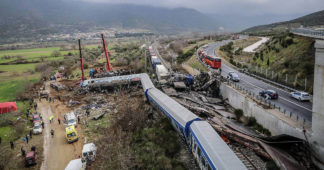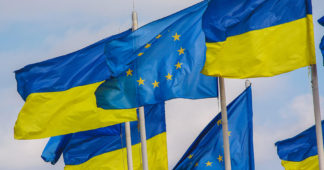By Dimitris Konstantakopoulos
It’s unprecedented. In two European countries—both EU and NATO members—electricity was suddenly cut off. Two more countries, France and Morocco, were also affected by the blackout. Life came to a standstill in the two countries most heavily impacted: passengers were trapped in trains, airports plunged into chaos, and in Spain alone, the estimated damages could reach 800 million euros.
This is no small matter, nor has anything like it ever happened before—a total blackout in two countries and partial outages in two others. To this day, no one has offered a satisfactory explanation of what happened—or even a plausible hypothesis as to how such an “accident” could occur, if it was indeed an accident. Of course, as always, some are quick to use the incident to promote their own narratives. The left blames privatization—and indeed, new private owners are more interested in boosting profits than in raising costs by investing in network security. Nuclear energy advocates seized the moment to argue that the reduced share of nuclear power in the national energy mix is to blame. The far-right points fingers at renewable energy—that’s their go-to grievance. But none of them are offering strong arguments.
After all, we live in an age of irrationality, fanaticism, and Manichaeism—where loud voices abound, but evidence and reasoning are in short supply.
But if it wasn’t a mysterious accident, then it was a cyberattack, carried out with a “shock and awe” strategy. If such a scenario is accurate, then welcome to the brave new world of cyberwarfare.
The Spanish leadership has, of course, categorically denied this possibility—so categorically that it seems unwilling to even begin the search for a culprit, possibly fearing the complications that might arise. After all, how can one categorically deny such a possibility when the exact cause of the incident remains unknown? Still, the government failed to convince even the country’s Supreme Court, which ordered an investigation into the possibility of a cyberattack, leaving nothing off the table. This is also the approach taken by Spain’s intelligence agencies, including the National Cryptology Center and the National Intelligence Center.
The possibility of a cyberattack was taken seriously enough to make headlines in major international media outlets. “No evidence of cyberattack,” was the title chosen by The Guardian. But that could just as well be read in reverse: “No evidence that it wasn’t a cyberattack.” If the possibility was not serious, it wouldn’t have been discussed—let alone featured on front pages.
The most likely scenario is that we’ll never know with certainty what really happened. And if we never find out, that may be precisely because what happened is too important to be disclosed.
Two suspects
If it was a cyberattack, then who might have been responsible? Politico, a thoroughly mainstream and well-informed media outlet with major influence in the West, identifies two possible culprits: Israel and Russia. As it wrote: “Spain’s opposition to Israel’s war in Gaza and its support for Ukraine against Russia’s invasion have made it a major target for cyberattacks.” https://www.politico.eu/article/spain-portugal-power-blackouts-energy-electricity/
The reference to Israel is bold and unusual by current Western standards, where even the slightest criticism of this country often leads to swift accusations of antisemitism and public condemnation. On the other hand, while it can’t be ruled out entirely, the scenario of a Russian cyberattack seems unlikely. It is true that Spain has followed NATO’s general anti-Russian stance, but its role in the Ukraine conflict has been secondary. It is not among the countries most aggressively pushing now for the continuation of the NATO war. It is governed by a coalition of Socialists and the radical left—the latter having many reservations about Ursula von der Leyen’s program of mass European rearmament. If Moscow wanted and was able to strike, one might wonder what it would gain by targeting Spain — why not attack the UK, France, Germany, the Baltics or Ukraine itself?
Moreover, if there were even the slightest solid indication that Russia was behind the blackout, wouldn’t Europe have erupted in condemnation of Moscow?
Some colleagues in Spain we spoke suggest that probably Politico’s reference to Russia was included so that the mention of Israel wouldn’t stand alone. And they add: if a media outlet like Politico made such a suggestion about Israel, it likely had a very serious reason to do so. After all, media of Politico’s stature often maintain some level of connection with major Western intelligence services. Clearly, if a major European country like Spain truly suffered such a cyberattack, it would not go unnoticed by its intelligence agencies—nor likely by those of other EU states or the US. The article, therefore, might also be read as a kind of warning, our colleagues underline.
Possible Motives and Preconditions
The probable reason that could lead Israel to take such an action is Spain’s highly active stance in favor of Palestine, which has greatly strained its relations with Tel – Aviv. Madrid recognized the Palestinian state a year ago, along with three other European countries. A few days ago, under pressure from the radical left faction within its ranks, the Sánchez government was forced to cancel a major ammunition purchase contract from Israel, citing the latter’s genocidal actions.
At the same time, Spanish authorities have reopened the case and are conducting investigations, in collaboration with France, regarding the alleged surveillance of Prime Minister Sánchez and other Spanish politicians using the Israeli Pegasus spyware. It is worth noting that this same system was reportedly used to spy on French President Macron, a fact that says much about the correlation of power between France and Israel https://www.reuters.com/technology/cybersecurity/spain-reopens-israeli-spyware-probe-sharing-information-with-france-2024-04-23/! Pegasus was also used, alongside the Kandiru software, to monitor dozens of Catalan politicians in the Katalangate scandal. The human rights group Irídia and Amnesty International concluded that those responsible for this case were the heads of the Israeli company NSO, who later attempted to cover their tracks by appearing as heads of various companies in Luxembourg.
Already since last year, top Israeli hackers have settled in Barcelona, from where they coordinate their operations across the European Union https://www.haaretz.com/israel-news/security-aviation/2024-12-26/ty-article/.premium/israeli-hackers-flock-to-barcelona-as-spyware-industry-shifts/00000193-fec4-df5b-a9b3-fec5d9dc0000.
The fact that Israel is now under the control of an extreme, fanatical leadership that seeks to immediately expel or eliminate the Palestinian population—and has every reason not to care about the formalities of “Western democracies”—is certainly a factor that would facilitate undertaking such international actions, which under normal circumstances would be considered extreme adventurism, especially against two EU and NATO member states. Israel also appears to have become one of the most powerful global forces in surveillance and all forms of “information warfare.” Together with the Americans, it has likely organized cyberattacks against Iran’s nuclear reactors, the pager attack in Lebanon, while officers from the Israeli armed forces have been placed in key positions at all major internet giants such as Google.
(As revealed by the Greek editor Mr. Vaxevanis https://www.ieidiseis.gr/politiki/351413/vaxevanis-toylachiston-15-anthropoi-ekanan-tis-synakroaseis-gia-na-min-akoyei-oli-mera-o-k-mitsotakis/ —without being denied by anyone—Israeli officers also organized the infamous surveillance scandal in Greece. We can’t rule out that the revelations about this scandal came from US agencies, who thought the Israelis had gone too far.)
Everything we wrote so far remain of course speculative and analytical reasoning at best—indications rather than conclusions. But we have written them because we consider important that the public and those still interested for the security of European nations are informed about what is being discussed in the more serious circles of the West itself.
The Role of Jorge
This is a good opportunity to recall that the infamous Tal Hanan, or “Jorge,” an Israeli “entrepreneur” and former (?) special forces officer in the Israeli army, who was linked to Cambridge Analytica—a company accused of manipulating millions of Facebook users to vote for Trump — has claimed responsibility for cyberattacks during the lead-up to the (non-binding) 2014 Catalonia independence referendum. These attacks targeted the local government and various websites that encouraged people to vote in the referendum. Cyberattacks were also carried out against the emergency medical services website, the Catalan police, and the internal website of the Catalan judicial system.
It’s worth noting that the role of Jorge and his team in cyber warfare and public opinion manipulation—using millions of personal data points and other methods—was exposed in an investigation by some of the world’s biggest newspapers. His team engaged in disinformation, hacking, and espionage methods and allegedly influenced 33 elections worldwide www.theguardian.com/world/2023/feb/15/revealed-disinformation-team-jorge-claim-meddling-elections-tal-hanan
The commotion about Jorge and his team, however, was short-lived. “Someone” ensured the issue would quickly fade from public debate. As for journalists, nowadays the vast majority are paid not to uncover or investigate— but rather to remain silent, to cover not to uncover. And if something does get revealed, it’s usually when powerful forces within our increasingly totalitarian West clash between themselves.
At the Heart of the Rising Global Authoritarianism
Regardless of what did or did not happen in Spain with the blackout, what is certain is that Israel’s intelligence services and armed forces—along with US agencies—have privileged access to the oligopolies controlling more and more our Internet world and representing the avantguarde of the emerging Western authoritarianism. And perhaps, the Israelis have an even stronger “sense of purpose” or “mission” than the Americans themselves and can often leverage the latter for their own goals.
The Israeli military’s privileged relationship with Google is believed to give them access to data from hundreds of millions of users. Google collaborates closely—and will collaborate even more closely—with the Israeli military, which will thus gain even greater access to user data. The same applies to Meta and Facebook.Wiz Acquisition Puts Israeli Intelligence In Charge of Your Google Data “Veterans” of Israel’s Unit 8200 have taken key leadership positions at the biggest tech companies like Google, Facebook, Microsoft, and Amazon https://www.defenddemocracy.press/the-former-israeli-spies-working-in-top-jobs-at-google-facebook-and-microsoft/
Unit 8200 specializes in surveillance and the collection of incriminating data, and its officers designed and installed Pegasus spyware, which has been used to monitor tens of thousands of politicians worldwide and was probably used in the murder of Saudi journalist Jamal Khashoggi.
These four tech giants, along with Peter Thiel’s Palantir—Thiel being a dark “cardinal” of Trump and of the masterminds of his authoritarian plans—collaborate closely and contribute significantly to the crimes taking place in Palestine.
https://www.defenddemocracy.press/tag/thiel-peter/
Translated from Greek by Christian Haccuria











